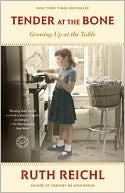More on this book
Community
Kindle Notes & Highlights
“Oh, it’s just a little mold,” I can remember her saying on the many occasions she scraped
the fuzzy blue stuff off some concoction before serving what was left for dinner. She had an iron stomach and was incapable of understanding that other people did not.
This taught me many things. The first was that food could be dangerous, especially to those who loved it. I took this very seriously. My parents entertained a great deal, and before I was ten I had appointed myself guardian of the guests. My...
This highlight has been truncated due to consecutive passage length restrictions.
I was slowly discovering that if you watched people as they ate, you could find out who they were.
the more odd and interesting things there were in the refrigerator, the happier my mother was likely to be.
With our well-trained stomachs my father and I could take whatever Mom was dishing out, but for most people it was pure poison.
I wasn’t very happy about the soup. Mom had left the crabmeat out of the freezer to defrost for two days, and even she didn’t like the way it was smelling. “I think I’ll just add a little more sherry,” she kept saying as she poured in bottles of the stuff.
Alice would have snickered derisively at the notion, but she was the first person I ever met who understood the power of cooking. She was a great cook, but she cooked more for herself
than for other people, not because she was hungry but because she was comforted by the rituals of the kitchen.
Alice is doing?” Alice and Aunt Birdie had the easy relationship of two people who have been deeply disappointed by life, but not by each other.
“Hope never hurt anyone,” she replied.
“I am not your mother,” she said succinctly. “I do not turn on the gas and then go into the living room looking for matches. Normal people do not set themselves on fire.”
Disaster was always simmering just below the surface and we cherished every peaceful moment with my mother. By then we were starting to suspect the truth, that my mother was a manic-depressive, but neither of us knew what to do about it. When lithium entered our lives a few years later we were deeply grateful: up to then we both believed, in our secret hearts, that my mother’s moods were our personal responsibility. Mom never knew who she was going to be when she woke up in the morning and Dad and I danced around, doing our best to avert trouble. When we somehow managed to do it we were so
...more
are. But they like sweets best of all, and that year I discovered the secret of every experienced cook: desserts are a cheap trick. People love them even when they’re bad.
And then, together, we all chorused the line I heard every day of my life, “You’d be so pretty if you’d just lose a little weight.”
We hadn’t meant to be a commune, but the house was so big it seemed selfish not to use the space.
But it was hard for any of us to defend our position; in the face of Nick’s moral rectitude we always seemed, well, bourgeois.
Without any discussion the morality of garbage changed our diet.
If she were normal, of course, I wouldn’t be here in the first place: in her own strange way she was the glue that kept us together. Being a family meant dealing with Mom.
a mantra. “Only four more days. I can take it.” My mother did everything to create chaos, but for the first time in my life I refused to join her. When
She thrived on chaos and as the house became neater she began to deflate like a balloon, growing more docile with each passing day. Three days before the party she actually asked what she could do to help. We polished silver and washed plates. We planned flower arrangements. I thought we were having a pleasant afternoon, but the next day she refused to get out of bed.


